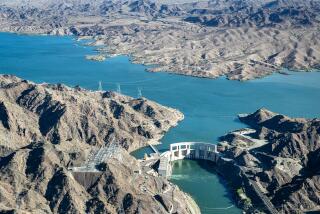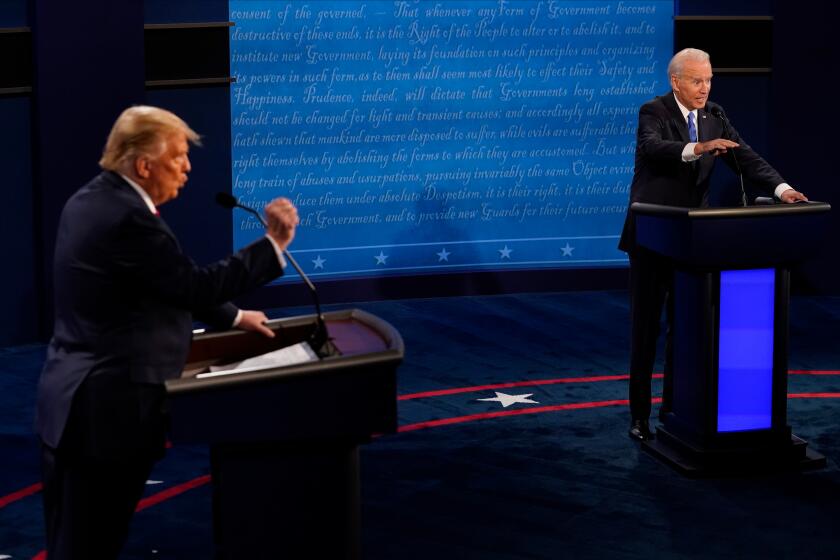No New Taxes Seen in Water Proposal : Resources: A Wilson aide says fees would help federal Central Valley Project pay for itself if it is taken over by the state.
The top-level official who will try to negotiate Gov. Pete Wilson’s proposed takeover of the debt-ridden federal Central Valley Project water system voiced optimism Friday that the deal could be accomplished at no cost to California taxpayers.
Instead, said Resources Secretary Douglas P. Wheeler, users of Central Valley Project water might have to accept high enough water fees so the system pays for itself, in the same manner as the State Water Project.
Wheeler said he was “confident that the governor would not accept terms which further burden the state’s financial situation.”
“It is a bit premature to talk about (further) specifics,” Wheeler said, declining to speculate about how costs would be allocated under state ownership of the 56-year-old federal water and hydroelectric project that stretches the length of the Central Valley from Lake Shasta in the north to the Tehachapi Mountains in the south.
In Washington, congressional Democrats said Wilson was on the right track in seeking state operation of the vast federal water works, but opposed his suggestion that pending major water legislation be held up while the transfer was negotiated with the Interior Department.
Any transfer of ownership to the state would require congressional approval. Pending legislation calls for a six-month study of such a transaction.
A spokesman for Sen. Bill Bradley (D-N.J.), an outspoken enemy of federal taxpayer subsidies to Central Valley Project farmers and a major force in water legislation, said the senator disagreed with “the governor’s idea of stopping progress on legislation to try negotiating his proposal.”
“The notion of deferring action while that is negotiated, I think, is a non-starter,” said John Lawrence, chief of staff to Rep. George Miller (D-Martinez), chairman of the House Interior Committee who long has called for Central Valley Project reforms.
“Congress has made clear it believes there are severe economic and environmental problems with the CVP which must be remedied before we are simply going to unload the project on the state,” Lawrence said.
Wilson proposed the transfer negotiations with the Bush Administration on Thursday. He said that water legislation by Bradley and Sen. J. Bennett Johnston (D-La.) would deal heavy economic damage to California under the banner of protecting fish and wildlife.
The proposed federal legislation would reallocate blocks of Central Valley Project water historically designated for agriculture uses to environmental protection and make some supplies available for industrial and urban users, such as the Metropolitan Water District serving Southern California, which now receive no project water.
Environmental protection organizations, which have favored operation by the state of the federal project with the California Water Project, welcomed Wilson’s endorsement of a transfer, but assailed his proposed delay of action on the federal bills.
“It’s a stall and cloak tactic,” said David Yardas of the Environmental Defense Fund, which supports the Johnston-Bradley legislation.
“The governor is trying to provide some kind of cover for John Seymour, the appointed, most junior member of the Senate,” Yardas asserted. “The way he has chosen to do that is once again call for negotiations on a non-issue that has been on everyone’s screen for a year.”
Seymour, who is seeking election to the Senate seat Wilson vacated when he became governor, has introduced alternative legislation. Contents of his bill were drafted in large part by Central Valley agribusiness interests. The bill has taken a back seat in Congress.
Wilson’s action, however, drew praise from Jason Peltier, general manager of the Central Valley Project Water Assn., whose grower members use more than 95% of Central Valley Project deliveries and who believe they have been unfairly harmed by “environmental extremists in Congress.”
The Central Valley Project, originally conceived more than half a century ago as a state project, has rolled up a debt estimated in excess of $6 billion. This was in large part because of the subsidized water and construction loans that, in effect, required no interest payments.
Wheeler, who was executive vice president of the World Wildlife Fund and Conservation Foundation when Wilson selected him to be his Cabinet secretary for natural resources in 1990, said that “pending discussion of the particulars, we cannot foresee the final outline” of an agreement.
But, he said, that “it will be a principal objective to maintain the user-pay concept” for state operation of the Central Valley Project, noting that the State Water Project was built and financed by users without taxpayer subsidies.
“We are not in a position to anticipate any time soon spending great capital” for any current cost of the project, Wheeler said. But he said that for its taxpayer investment in the project, “the federal government may feel there is need for reimbursement.”
Ingram reported from Sacramento and Bunting from Washington.
More to Read
Get the L.A. Times Politics newsletter
Deeply reported insights into legislation, politics and policy from Sacramento, Washington and beyond. In your inbox three times per week.
You may occasionally receive promotional content from the Los Angeles Times.






